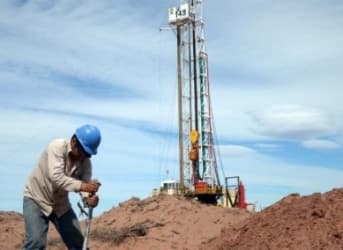Argentina once led the Americas in wealth creation, but today the Argentine government is in default and doing everything it can to attract foreign capital. The Kirchner administration has imposed overbearing trade restrictions, allowed inflation to escalate, and defaulted on Argentina's sovereign debt, making foreign firms wary of Argentine promises.
But the winner of the 2015 Presidential election can change all that. He will have one chance to restore Argentina to its former glory – by taking advantage of the Neuquén basin's Vaca Muerta shale oil and gas reserves.
Argentina's top three presidential contenders – Sergio Massa, Mauricio Macri, and Daniel Scioli – have criticized President Kirchner's economic model and promised to develop Vaca Muerta for Argentina's strategic benefit. Related: How Driverless Cars Will Upend Energy Markets
Massa, a former minister under Kirchner, promised central bank independence; Macri, the mayor of Buenos Aires, promised a return to investment grade; and Scioli, a Kirchner ally and occasional critic, agreed with the other two on ending agricultural export restrictions. All three have broken with President Kirchner's economic and monetary policies, allowing each candidate to create his own framework for attracting and managing foreign investment. But more is at stake here than currency reserves and cheap energy. Whoever wins this election will manage Vaca Muerta and thereby influence Argentine foreign policy for generations to come.
For instance, the new president could favor China's state-owned Sinopec, Argentina's fourth-leading oil producer. The Chinese have already spent billions in the Argentine energy sector, including the 2010 purchase of Occidental Petroleum's Argentine assets. Looking north, China has committed $50 billion of direct investment to Brazil, and expanding into neighboring Argentina could be part of China's long-term strategy to consolidate influence in South America. Would strengthening ties with China threaten Argentina's relationships with other countries? That's a question the new president will have to ask himself. Related: Top Three Rebound Stocks In The Permian Shale
The United States is one of four countries – along with China, Canada, and Argentina – with enormous shale gas reserves. But U.S. companies are in a league of their own when it comes to profitably drilling into shale. That's why Argentina's state-owned oil company, YPF, has teamed up separately with Chevron and Exxon Mobil to exploit the Vaca Muerta reserves. If the joint projects go well, the new Argentine president will strengthen commercial ties with the United States and attract more than just energy investment.
But Argentina is still far from convincing U.S. investors that it won't expropriate assets and manipulate exchange rates – again, policies remain completely in the hands of the next president. Unlike the Kirchners, who were locked into a post-crisis recovery strategy, the new Argentine president will have the opportunity to shape economic policy according to his own vision. Related: Indonesia Banking On A Big Return To Oil And Gas
Russian President, Vladimir Putin agreed to invest $1 billion in Vaca Muerta through Russia's state-owned Gazprom. Russia could sell this oil and gas into the South American market and turn a profit that way, but that's not the only option available. Gazprom could develop supplies of oil and gas in Argentina and ship it across the Pacific to the lucrative Asian markets or, alternately, across the Atlantic to Europe. Of course, all of these questions assume a 25-30 year outlook, but that underscores what's at stake here.
If the new president plays his cards right, Argentina will become a net energy exporter and supply lucrative markets in Asia and Western Europe. Oil companies from China, Russia, Europe and North America have already staked their claims in Argentina, and if the new president leverages these relationships, he'll initiate more trade between Argentina and the world's most advanced markets. As we approach the October elections, it's clear the Vaca Muerta is a conduit through which foreign investors will enter the Argentine market – but their willingness to stay will depend entirely on the disposition of the new president.
By Gonzalo Molina for Oilprice.com
ADVERTISEMENT
More Top Reads From Oilprice.com:
- Gazprom-Shell Partnership Flies In The Face Of Sanctions
- Why A U.S Shale Slowdown Will Hardly Affect Oil Prices
- China’s Energy Demand May Not Increase Until 2017


















